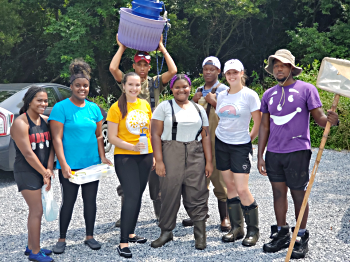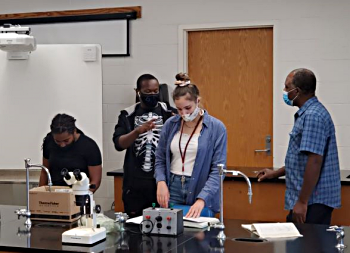
UMES hosted eight high school seniors from across the country, including Puerto Rico, this past summer for the 2021 Geosciences Bridge Program. Funded by the National Science Foundation and the NOAA Living Marine Resources Cooperative Science Center at UMES, the program offers students interested in pursuing a career in the geosciences field a leg-up by introducing them to ocean sciences, atmospheric sciences, and geographic information systems and Remote Sensing technologies before their freshman year of college.
The six-week (June 28-August 6) paid internship program was able to resume as an in-person experience this year after going to a virtual format last year due to COVID-19. The program includes lectures, field trips, hands-on activities, one for-credit college course, weekly seminars on college-prep topics, housing, meals, travel to and from campus and a stipend.
“Field trips were limited this summer due to the pandemic, however, our interns were involved in hands-on, environmental modules and team building activities,” said Cy’Anna Scott, coordinator for the program and a graduate research and teaching assistant at UMES.
Geoscience interns learned new sampling techniques that enabled them to collect water to take water quality measurements. They also used push nets and learned to seine to gather zooplankton and benthic invertebrate samples in the Chesapeake and Maryland Coastal Bays, Scott said.
“In the Remote Sensing and GIS weekly module, the students created story maps using ArcMap by importing data with latitude and longitude coordinates and joining datasets to create new maps,” Scott said. “They also learned how to take weather observations in an atmospheric science module and presented their findings as mock weather reports.”
A field trip to Assateague Island National Seashore on the Maryland side provided the interns with a Coastal Clean-Up experience. Information from the trip was submitted to the International Coastal Clean-Up program to add to its scientific database, Scott said. To conclude the program, the students gave a group presentation titled, “Water Quality and Fish Communities in Maryland Coastal Bays.”
For more information on UMES’ Geoscience Summer Bridge Program, email cascott@umes.edu. Applications for the summer 2022 program will be accepted beginning in December 2021. To apply, visit www.umes.edu/cscgeosciences.
Gail Stephens, agricultural communications, University of Maryland Eastern Shore, School of Agricultural and Natural Sciences, gcstephens@umes.edu., 410-621-3850.





